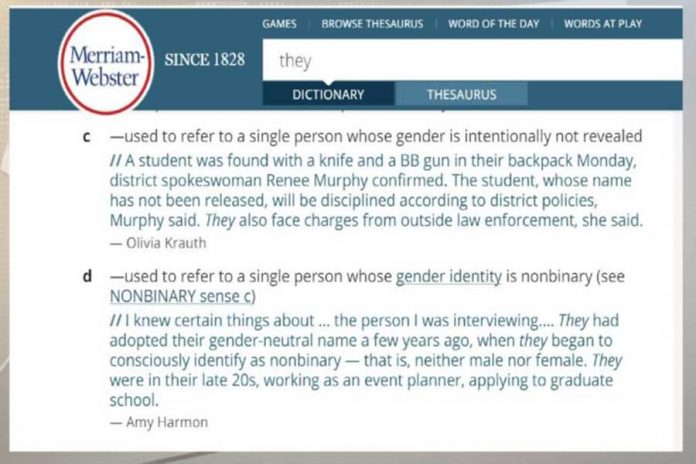Last week, Merriam-Webster announced its word of the year is “they,” used singularly. Searches for “they” increased 313 percent from 2018 to 2019. “People were clearly encountering this new use and turning to the dictionary for clarity and for usage guidance,” Senior Editor Emily Brewster said in a statement.
Most people in the LGBTQ community are aware that the “they” Merriam-Webster named as the word of the year is a singular pronoun often used by nonbinary and gender-nonconforming folks in lieu of the binaried pronouns the United States so rigidly clings to. Widely reported on, the word of the year honor is a victory for our community, arriving just in time for the holidays when many nonbinary and gender-nonconforming folks are misgendered by family and friends alike. Hopefully, Merriam Webster’s award offers everyone the opportunity to educate themselves.
While many try to proclaim the singular use of “they” is new, its first documented use, according to the Oxford English Dictionary, was in 1375 in a poem titled, “William and the Werewolf.” The singular “they” slowly fell out of favor during the 18th century, but many modernists (including W.H. Auden) continued to use it in their writing throughout the 19th and 20th centuries.
Aside from a complex history and an international view supporting gender outside of the binary, one’s identity and identifiers should always be respected, validated and acknowledged. No reason or deep dive into gender should be necessary.
Also this year, Apple released iOS 13.2, which included gender nonbinary emojis featuring people with neutral-colored (all colors should be considered neutral) shirts, hair and professions.
Of most importance in Philadelphia, PennDOT announced that an option for “X” on state-issued identification cards is imminent, though some had already achieved a similar designation of “U,” thanks to PennDOT hero Linda. While an accomplishment for the LGBTQ community, plenty of articles online began to detail the cost for different states that have decided to include an option of “X” on ID cards. Our community — and every other systemically oppressed community — knows too well that our dignity is often set against a price tag. How much does HIV research cost? How much does it cost to change marriage certificates and licenses? What is the cost of implementing gender-inclusive bathrooms? How much does gender-affirmation surgery cost the military, prison system, state, nation? What is the value of our life? Cost should be irrelevant when talking about life and death, dignity and respect. We know our lives are valuable. When will we stop having to convince others of it?
While “they” is only one of many gender-inclusive pronouns — alongside ze, ey, xe, ae, fae, per, ve and others — it is certainly the one that has gained the most traction, created the most controversy and led to the most change in recent years.
We can only hope the press surrounding an award-winning “they” leads to more recognition and education around gender inclusivity and nonbinary identities.

